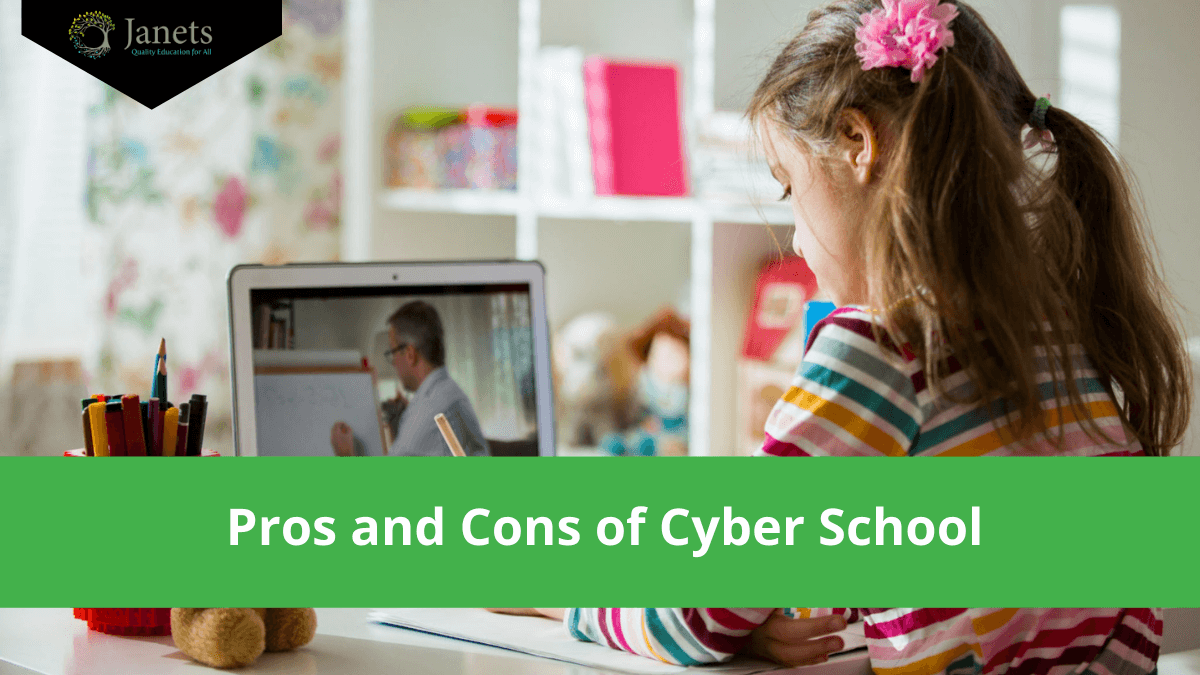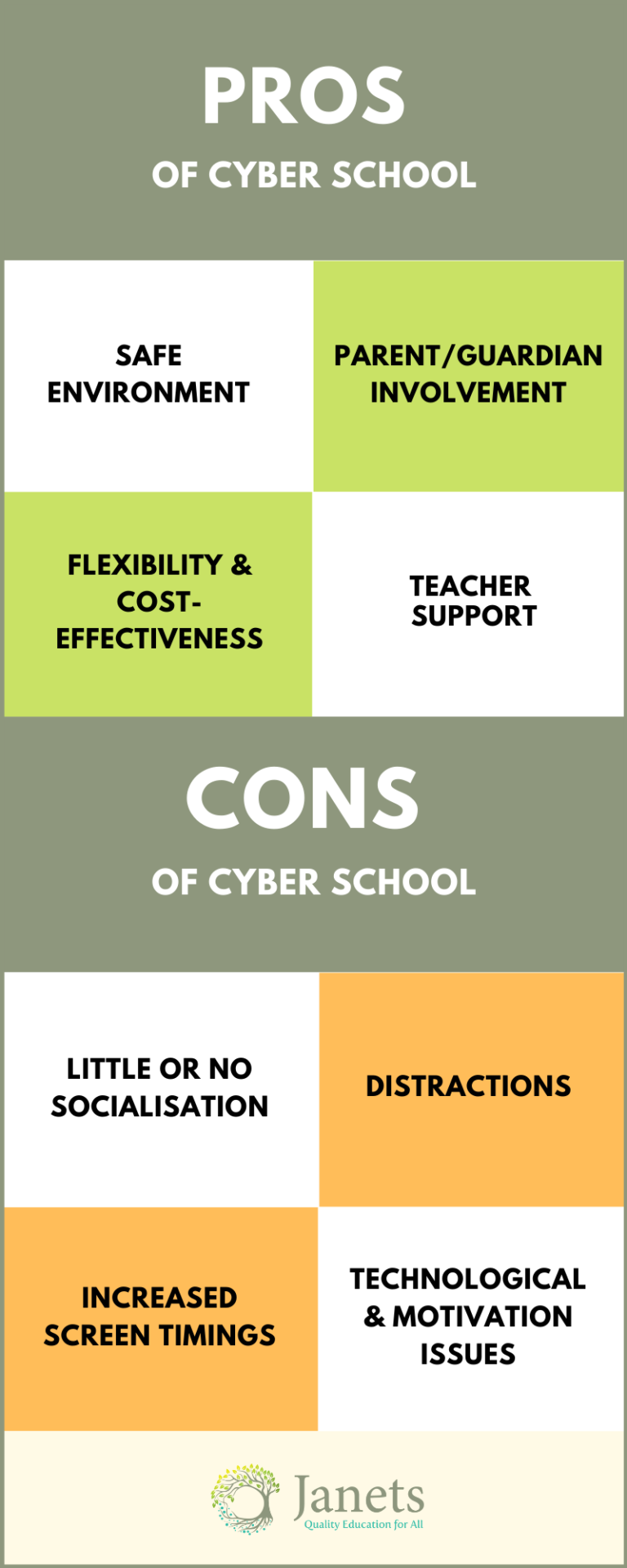- Home
- Teaching and Education
- Pros and Cons of Cyber School
Pros and Cons of Cyber School

Cyber education is an excellent way to get your child to experience the learning process. Due to the global pandemic, COVID-19, cyber schools are gaining immense popularity. However, there are several pros and cons of cyber school. This article will discuss all these pros and cons of cyber school and provide you with a handful of information.
What is Cyber School?
Due to the rapid evolvement of technology, the virtual world is getting more and more popular. Cyber schools are a part of that technological evolvement. They are run by using several modern teaching technologies to make the learning experience similar to traditional schools.

Cyber school operates by providing education to students online. It can be any course- school education, diploma, certificates or even a degree. You can complete the entire course online and receive your certification upon completion. Several governing bodies accredit all the courses in a cyber school.
There are also many opportunities in the cyber schooling field. For example, if you are interested in designing courses and create a technologically friendly online learning experience for everyone, you could get into our Best Seller-Online Class course. Courses like these teach you all the marketing and technological skills to support online education. The demand is relatively high for online education in recent days, so this career field is quite promising. So, if you are interested in cyber schooling, this could be a potential career option.
An overview of Cyber School
The only difference between a cyber school and a regular school is that a cyber school is operated through a camera and involves virtual interaction. So, all you need is a well-functioning laptop, iPad, desktop or smartphone and a proper internet connection. In contrast, normal schools involve classrooms and face to face interactions.

Additionally, if students require any support from their tutors, they can either reach out through an email or take individual lessons through a video call. This is best suited for the ones who cannot attend the schools physically. This includes people with disabilities, family problems, geographical locations, busy schedules, etc. Thus, the existence of cyber schools has made a lot of people get access to proper educations.
However, there are several pros and cons of cyber school. It may be the best option for some, but not a suitable choice for others. So, it is best to know all its pros and cons before deciding for your child or even for yourself. Therefore, let us have a look at some pros and cons.

Pros of Cyber School
Many families in the UK are enrolling their children into cyber schools now and are very happy with the service. These schools provide a tremendous amount of flexibility and encourage people from all life paths to continue their education.
One of the essential advantages of cyber school in today’s time is because of the COVID-19 spread. Many cities are going under lockdown, hampering the usual education process. But, those who were already enrolled in cyber schools did not require to worry much. However, let us now look at the 5 most significant pros of cyber schools.
1. Safe Environment
Cyber schools allow you to study in the comfort of your own home. It is entirely home-based. Thus, you are in charge of the surrounding environment. There will be no external hazards affecting your child. There will also be less transmission of diseases from others, and your child would not get infected very often. Most important from deadly viruses such as COVID-19.
In addition, a lot of children become victims of bullying and peer pressure at schools. This affects their confidence level, which further hampers their studies.

There are also many drug issues and violence cases at traditional schools. Children get into fights very quickly after a minor disagreement. Many teenagers get into sexual relationships and end up getting pregnant at an early age. All of these factors hamper the learning process of a child and distracts them. Thus, a cyber school solves all of these problems and make a safe environment for learning for your child.
2. Parent/Guardian Involvement
Cyber schools allow parents and guardians to be more involved in their child’s education. These schools will enable them to stay in touch with the teachers regularly. These encourage parents and guardians to actively help their children with their studies and keep track of everything. Moreover, they can notice their child’s behaviour more closely, keep track of their behaviours, and help them with their weaknesses.

Also, parents or guardians can make the study set up by themselves. They can also make sure that their child isn’t taking unnecessary breaks between classes or making any false excuses to their teachers. Additionally, using interactive learning tools can make study and quiz sessions more engaging and effective. Parents can create a more dynamic learning environment at home, encouraging their children to participate actively. Moreover, sometimes children try to hide their homework or don’t do their assignments properly. But, since children are under supervision by their parents or guardians at home, they rarely hide any information from their parents.
3. Flexibility
Flexibility is probably the primary pros of cyber schools. Students can work on their tasks and assignments at any time of the day, whenever they feel like it. Furthermore, they can access all their classes from any geographical location that has uninterrupted internet service. This allows students to become good multitaskers in the future. Therefore, they can read and review course guidelines and learning materials at their own pace.

Several other factors would benefit from these flexibilities. They include:
For high school students, cyber schools allow them to:
For adults returning to education, cyber schools allow them to keep their full-time jobs and fulfil their family responsibilities. Thus, all factors can be dealt with efficiently in cyber schools instead of writing a leave application and providing several supporting documents. Moreover, the flexibilities also teach students time management skills since they need to schedule and juggle everything.
4. Teacher Support
Cyber schools provide one to one guidance from teachers all the time. They make sure that the teacher-student relationship is very smooth. This is why guardians are less worried about their children getting proper teacher support. Students always have an option to get personalised classes from teachers if they are struggling. Accordingly, these teachers act a mentor in helping a child grow by providing proper guidance.

Moreover, teachers at cyber schools are actively involved with the parents too. Thus, together they discuss a child’s progress and future aspirations. These teachers would provide every support a child needs to take them in the right direction. Teachers at cyber schools likewise play a functioning job in the training of their students and are always available to answer any questions. If they notice a student struggling a lot in a particular subject, they provide one-on-one consultations.
5. Cost-Effectiveness
Cyber schools require fewer resources. This makes it more cost-effective than the usual schools. Students only need to spend money on textbooks or other school supplies. Most of the materials are provided online by the teaching faculty. Moreover, additional miscellaneous costs such as transportation, lunch, lab costs, etc., is omitted in cyber schools.

This advantage is a great help for some families. Because if a family is struggling to make their ends meet, if they can have an option to cut some expenses in their child’s education, it is indeed a big help. Most families struggle to pay more for their child’s education at some point. This is when cyber schools come to help. They provide formal education to these children, and they can graduate with a certificate that holds the same value as a traditional certificate.
Cons of Cyber School
Among the numerous benefits of cyber education, there are some disadvantages too. Just like any other thing, there are both pros and cons of cyber school too. It depends on different individuals on what they prefer to focus on at the end of the day. Therefore, let us now look at the 5 cons of cyber schools.
Little or No Socialisation
Traditional schools have several recreational activities and several options for the students to engage with each other. For example, they have social gatherings, annual days, etc. Students were also placed in groups to work on different projects, presentations, etc. Therefore, all of these activities make them socialise. As a result, their interpersonal skills such as teamwork, leadership, and social skills develop.

On the other hand, cyber schools have little or no socialisation options for their students. It affects a child’s mental growth and makes them socially awkward in the long run. All they do is sit in front of a computer and do their classes. Even if they are put in groups, they interact with each other virtually. These sorts of interactions are done either via video conferencing or a phone call. On top of that, there are extracurricular activities such as sports day, science fair or even study tours. Thus, the only form of socialisation with their peers and teachers is through the virtual world.
Distractions
The list of distractions while attending a class in a cyber school is enormous. In a traditional brick and mortar school, the environment is only suited for learning and getting to interact with others. But, in a cyber school, children are in their home or any other comfort place. This means that the primary purpose of that environment is not for learning.

For example, at home, there can be many distractions. You might be having some intense family discussions going on; there might be guests over, doorbells, dogs barking, etc. Therefore, all of this might divert the thought process of your children from their studies. An adult might be able to omit all these distractions and focus on that one thing, But kids can’t do that. They easily get distracted. This might cause them to focus less on their studies.
Increased Screen Timings
Too much screen time is not suitable for children. But, in cyber school, children have to spend at least 7/10 hours of their day looking at screens. On average, it sums up to around 40 hours per week!

There are a lot of side effects of increased screen time:
On top of that, apart from the regular school hours, these children have to spend extra time in front of screens to do assignments or study any online resources. Later, if they feel like watching TV, playing video games, etc., that’s also more added screen time!
Technological Issues
A non-steady internet connection is enough to hamper the learning process of a child in a cyber school. The Internet also comes up with many distractions. Unlike work from home culture, where many companies have software to monitor the screens, cyber schools do not have that for the children.

Thus, children can quickly get distracted and start watching a movie, series or use social media in between their lessons. Some children might even begin watching adult, vulgar content since no one is watching them during the school timings. Therefore, these result in poor grades and take a child much further from social and family life. Thus, they end up living in the virtual world.
Motivation Issues
Cyber schools expect the students to take authority over most of their work and assignments. But, sometimes it gets difficult for them to finish them on time. They have to work in isolation, with no peer or teacher to assist them physically if they get stuck somewhere. Thus, for students who are not very motivated and very bad at working in isolation instead of groups, this is a significant disadvantage.

Less motivated and struggling students in cyber schools fail or withdraw more often than struggling students in traditional schools. Also, if struggling students do not have the motivation or personal interaction, their educational experience could be short-changed by cyber education.
Conclusion
There are several factors to consider when choosing the right type of education medium for your children. Therefore, the pros and cons of cyber school listed in this article will make your decision process much more straightforward and help you make the right decision for your child. Also, if you are considering a career in the cyber field, this article would help you decide.
Read more blogs
- From Console to Career: GAMIVO and Janets Partner to Shape the Future of the Gaming Industry
- Janets Partners with Humble Bundle to Support Hello World Charity and Empower Change
- What is Probate? An Essential Guide to Wills and Probate Law
- How to Write Your Personal Statement in 10 Steps
- How to become a Phlebotomist? Everything you need to know
- What is the minimum wage in the UK? Everything you need to know
- Keto Diet: The Ultimate Keto Guide for Beginners
- Can You Reheat Chicken? Best Practices and Tips
- 15 Project Management Challenges and How To Solve Them
- How to Become a Project Manager: Ultimate Career Guide
- Pros and Cons of Being a Project Manager
- The Psychology of Self-Motivation in Internet Learning
- Essential Tips for Successfully Preparing for the Life in the UK Test
- Mastering New Skills with AI: How Writing Tools Aid Online Education
- How to Tailor Your CV for Specific Job Applications






